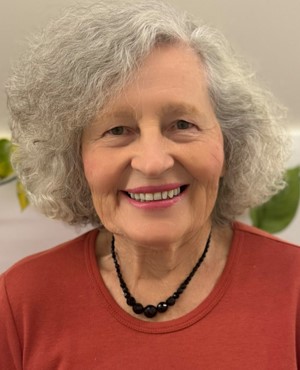ICMI Newsletter - December 2024
Editors:
Jean-Luc Dorier (ICMI Secretary-General)
Merrilyn Goos (ICMI Vice President)
Lena Koch (ICMI Administrative Manager)
Technical support:
Vanessa Chung, IMU Secretariat
Publishing dates:
March 15, June 15, September 15, December 15
1 Editorial – From the desk of Frederick K. S. Leung, ICMI President (2021-2024)
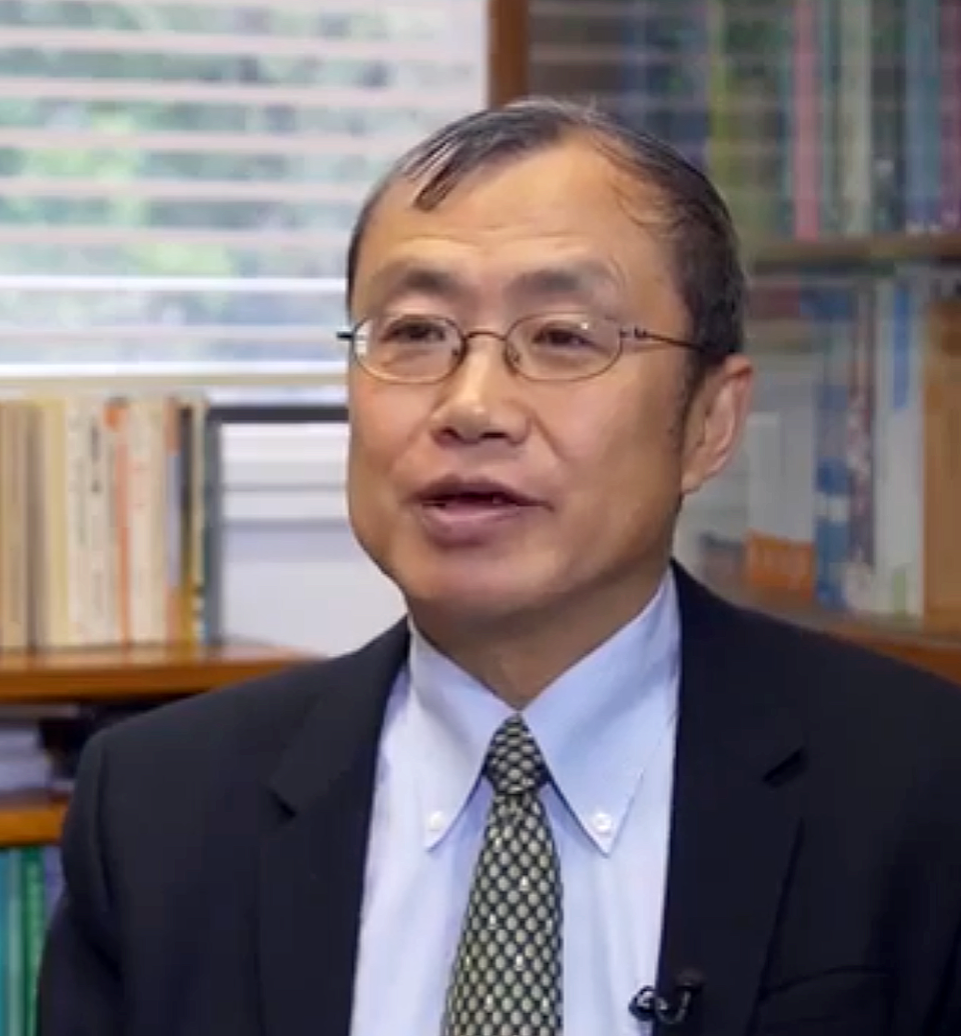 As I write this editorial, there is less than one month remaining in the term of the current ICMI Executive Committee (EC). Many at this stage might say something like, “Time flies; our term as the ICMI EC seems so short.” However, for me personally, the past three years and eleven months have felt quite long. At the start of our term, COVID-19 was impacting humanity at its hardest. The entire world seemed to have come to a standstill, waiting for the pandemic to subside and for life, including our students’ school life, to return to normal (half a year into my presidency, I found myself confined to a quarantine hotel room in Shanghai for three weeks, waiting to attend ICME-14!). The EC waited and waited earnestly for our first in-person meeting (which did not occur until more than a year into our term) so that we could “start working.” We felt, and still feel, that much more could have been accomplished if not for the pandemic. We will be remembered in the history of ICMI as the “COVID EC.”
As I write this editorial, there is less than one month remaining in the term of the current ICMI Executive Committee (EC). Many at this stage might say something like, “Time flies; our term as the ICMI EC seems so short.” However, for me personally, the past three years and eleven months have felt quite long. At the start of our term, COVID-19 was impacting humanity at its hardest. The entire world seemed to have come to a standstill, waiting for the pandemic to subside and for life, including our students’ school life, to return to normal (half a year into my presidency, I found myself confined to a quarantine hotel room in Shanghai for three weeks, waiting to attend ICME-14!). The EC waited and waited earnestly for our first in-person meeting (which did not occur until more than a year into our term) so that we could “start working.” We felt, and still feel, that much more could have been accomplished if not for the pandemic. We will be remembered in the history of ICMI as the “COVID EC.”
Beyond ICMI, we began to realize how a global medical event could have such a profound impact on our individual lives. Schools were severely disrupted, and the way instruction was delivered, including mathematics instruction, was forced to change. Our students’ learning and emotional well-being were adversely affected. Most schools were driven to explore distance learning through various forms of communication technology -- a mode of teaching and learning that, ironically, had been advocated by some educators and not been achieved, long before the pandemic.
Perhaps COVID-19 should remind us that the classroom has always been situated within a broader physical and socio-cultural context. In the real world outside the classroom, humanity is facing grave and unprecedented challenges today, with COVID-19 being just one of them. There is the urgent issue of climate change, leading to global warming and pollution. As I write, a large number of schools in Pakistan have been closed due to heavy smog, and many schools in Spain have been devastated by floods. Wars are ongoing in Ukraine and Gaza, and geopolitical tensions threaten the economic and social well-being of many. There are the perennial issues of global economic and educational inequalities, illegal and involuntary migration, unregulated AI, misinformation, and more.
Yet, for most classrooms around the world, teaching and learning continue as “business as usual.” Teachers are delivering a mid-20th-century, or even late 19th-century, curriculum. “Chalk and talk” still prevails; students engage in endless practice exercises; mathematics is treated as a set of skills to be mimicked and a collection of facts to be memorized. Beyond the classroom, in some educational circles, countries compete in international studies of mathematics, and education systems are ranked according to their students’ TIMSS or PISA mathematics scores. This is simply not right.
Take the global social issue of inequity as an example. As a United Nations report pointed out, “Inequity is perhaps the most serious problem in education worldwide. It has multiple causes, and its consequences include differences in access to schooling, retention and, more importantly, learning. Globally, these differences correlate with the level of development of various countries and regions.... Around the world, 258 million, or 17 per cent of the world’s children, adolescents and youth, are out of school. The proportion is much larger in developing countries: 31 per cent in sub-Saharan Africa and 21 per cent in Central Asia, vs. 3 per cent in Europe and North America” (The UN Chronicle, 2020). When teachers teach students about percentages, how many of us use examples of this kind, or do we continue to use percentages of apples and oranges in a box as our examples?
ICMI has just launched its 27th Study on Mathematics Education and the Socio-Ecological to reflect on “what is and might be the role of mathematics and mathematics education in multiple, intersecting, social, political, and ecological issues such as climate change, poverty, inequality, health crises, discrimination, and marginalization”. I hope the Study will eventually impact classroom teaching, helping our students (and their teachers!) become more aware of these sociopolitical and ecological issues.
Some may argue that mathematics is mathematics, and ICMI should not be involved in these ultra-mathematics education issues – shouldn’t the ICMI President, in the last ICMI Newsletter of his term, be talking about “real” mathematics education? But to me, addressing these socio-political issues is “real” mathematics education. Mathematics does not exist in a vacuum (I acknowledge that I am not subscribing to an absolutist view of mathematics here), and mathematics teaching and learning always occur within political and sociological contexts (and I am subscribing to a socio-constructivist position). Our students should not be learning mathematics in the isolated ivory tower of the classroom during the day and returning to the “real world” after school, as if the two worlds do not intersect.
Please don’t misunderstand me; I am not suggesting abandoning the traditional spheres of mathematics. In fact, the other ICMI Study launched by ICMI, Study 26, focuses on the traditional topic of Geometry, emphasizing “the role of geometry as a facilitator of advances in logical reasoning, strategic thinking, and exploring the role of Geometry as an arena or lever for developing children’s and adolescents’ mathematical creativity and flexible thinking.” It will also explore “Digital technologies in learning and teaching geometry” and the “Contributions of psychology and neuroscience to research in mathematics education focusing on geometry.” This study affirms the importance of "basic" mathematics in the development of students, especially in fostering curiosity and developing the capacity and habit of systematic, clear, precise, logical, and critical thinking. In an era of misinformation and fake news, the ability to discern truth from falsehood is all the more important.
As mathematics educators, we are not just teaching mathematics; we are teaching human beings mathematics. Our students have lives to live, and mathematics is just one of the many things they should learn, albeit a very important one. We need to prepare our students to use mathematics as one of the tools (among others) to contribute to solving the world problems mentioned above when they leave school and enter various professions. Even while they are still students, we should help them understand the world and its problems through the lens of mathematics, both as preparation for their future professions and to help them appreciate the relevance of mathematics.
In today’s world, there are many issues and challenges facing mathematics educators in general, and ICMI in particular. ICMI should not merely perpetuate existing practices, however good those practices are or have been (especially for past generations). We should prepare our students to better confront these issues and challenges, making mathematics more relevant to them and to the world. I am confident that the next EC will work with the ICMI worldwide mathematics education community to achieve this.
2. IDM 2025
Contact: Christiane Rousseau and Betül Tanbay,

The 2025 IDM theme is: Mathematics, art, and creativity
The 2025 IDM theme celebrates the creativity found in mathematical discovery and art. Using mathematics in art opens doors to new ideas, beautiful and captivating creations.
A special invitation is sent to teachers to celebrate mathematics, art, and creativity, showcasing the harmony of logic and imagination, where numbers dance with colors, equations sculpt beauty, and ideas transcend boundaries to inspire and innovate. Creativity unites mathematics and art, fields that may seem separate, but were originally intertwined, both seeking to reveal the beauty of the universe.
A special feature of 2025 will be the IDM School Program. The program connects schools from different countries that share a common language (English, French, Portuguese and Spanish) for a period of several weeks before or around the IDM. Teachers and their classes can participate in interesting and amusing math activities based on the 2025 IDM theme. Participating teachers will be offered a free virtual workshop in their language presenting attractive activities and background information. Afterward, teachers will join a group in a chat tool in the chosen language to exchange ideas and share experiences. If desired, schools can also work more closely together, organizing online meetings and/or live exchanges between students. The IDM team will moderate the groups.
The recurrent features of the IDM are the following:
- Resources (2025 IDM poster, pins, logos in all languages, etc.) will be offered.
- Activities to use either with the public or in the classroom are proposed in the Organize section. The new 2025 activities will comprise:
- An activity on artistic tilings,
- An activity on eclipses, since there will be a lunar eclipse during the night of March 13 to March 14 2025. The eclipse will be total in the Americas and will occur in the early morning of March 14. It will be partial or penumbral in other parts of the world including Europe and Africa.
- An activity on artistic polyhedrons - An international participation challenge around Mathematics and Art will be announced at the beginning of 2025. And people are invited to visit the 2024 Math Remix Challenge.
- A live coverage will take place on March 14 2025, both on the IDM website and on social media. We also intend to present a 90 minute live virtual celebration on March 14 2025.
The IDM team needs your help to pass the invitation to celebrate to the local community of school teachers and/or to the networks of schools of your country. In particular, we are looking for IDM ambassadors in many countries: see bottom of page.
Join us at www.idm314.org!
- Participate to the International Challenge announced beginning of January. Classroom participation is welcome
- Participate in the live coverage on March 14 (see the 2024 coverage as a reference) and watch the virtual ceremony.
- Visit the IDM website and share photos or videos of your activities on social networks.
- Subscribe to the IDM newsletter to receive all the information in the run-up to IDM 2025.
All schools around the world are invited to celebrate! Pass the word to the school networks around you! We are here to help.
Visit www.idm314.org for more information. The International Day of Mathematics is a project led by the International Mathematical Union (www.mathunion.org).
3. Follow-up on ICME-15
The 15th International Congress on Mathematical Education, ICME-15 took place in Sydney, Australia on July 7-14, 2024.
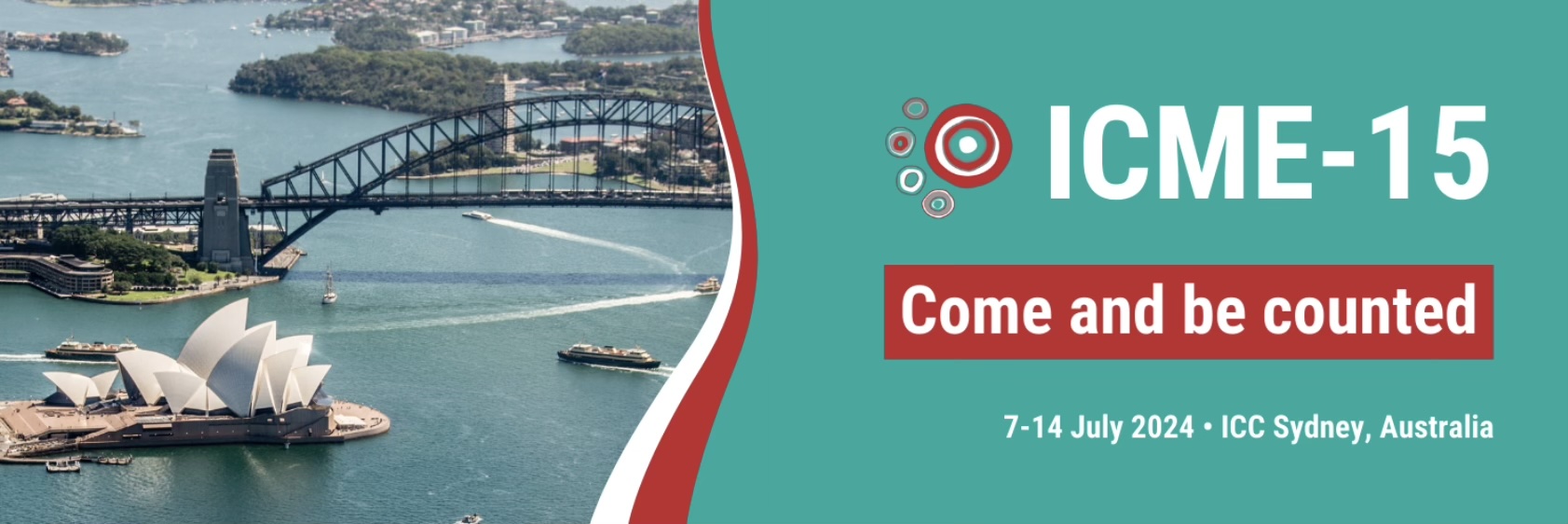 The congress was a sucessful international event that will hopefully advance studies, interest and support for mathematics education all over the world. A total of 2322 delegates from around the world participated in the congress. The congress was held under the auspices of the International Commission on Mathematical Instruction (ICMI). ICME-15 had a wonderful and rich program: four Plenary Lectures, two Plenary Panels, 30 Discussion Groups, 85 Workshops and 3 Award Lectures were offered. The convenor of ICME-15 was Professor Kim Beswick, Head of the School of Education, University of New South Wales, Sydney. The Chair of the Local Organizing Committee was Will Morony, former CEO of the Australian Association of Mathematics Teachers. Here you can find the ICME-15 website. Highlights and pictures can be found on the ICME-15 Facebook page.
The congress was a sucessful international event that will hopefully advance studies, interest and support for mathematics education all over the world. A total of 2322 delegates from around the world participated in the congress. The congress was held under the auspices of the International Commission on Mathematical Instruction (ICMI). ICME-15 had a wonderful and rich program: four Plenary Lectures, two Plenary Panels, 30 Discussion Groups, 85 Workshops and 3 Award Lectures were offered. The convenor of ICME-15 was Professor Kim Beswick, Head of the School of Education, University of New South Wales, Sydney. The Chair of the Local Organizing Committee was Will Morony, former CEO of the Australian Association of Mathematics Teachers. Here you can find the ICME-15 website. Highlights and pictures can be found on the ICME-15 Facebook page.
Here you can see the following videos of ICME-15: Plenaries, Plenary Panels, Awardees, Opening and Closing Ceremony.
4. Reports from ICME-15 Survey Teams
Surveys teams are commissioned by the IPC to examine new developments and progress on specific themes and issues that have arisen in mathematics education during recent ICMEs.
Survey teams review identifying and characterising important new knowledge, recent developments, new perspectives, and emergent issues, and each team will report their findings and recommendations at the Congress.
4.1 ICME Survey 1– Challenges and perspectives of mathematics assessment
Survey Team
University of Melbourne (Australia) (team leader)
Yuriko Yamamoto Baldin, Universidade Federal de São Carlos (Brazil)
Kim Koh, University of Calgary (Canada)
Ruhama Even, The Weizmann Institute of Science (Israel)
Ross Turner, The Australian Council for Educational Research (Australia)
IPC Liaison: Olive Chapman
The survey focused on formative assessment conducted by classroom teachers as part of the teaching-learning-assessment cycle, aiming to provide information for teachers and/or learners to use in upcoming lessons. We distinguish assessment from teachers’ normal continuous monitoring of students’ understanding by some formality to the process (e.g., by recording results).
When systematically surveying 105 papers on teachers’ use of formative assessment and teaching noticing for informing short-term instructional decisions, Ruhama Even found similarities, but also a surprising disconnection of the areas, and an important absence: teachers’ responses and acting on evidence of students’ learning are rarely studied in real classrooms.
In a sweeping survey of how learning progressions are used in assessment, Ross Turner found multiple kinds of learning progressions which vary in scope (from single concepts to whole domains), approaches to their development and underlying measurement models. He documented promising ways of organizing formative assessment along different learning progressions to help identify learners’ current knowledge, describe and report learning progress, guide teachers in the selection or development of suitable teaching and learning resources, and also support teacher professional learning. More support is required for teachers to adaptively enhance their learners’ knowledge.
When systematically surveying the assessment of higher-level mathematics thinking competencies (including 21st century competencies), Kim Koh found that many curricula now highlight deeper mathematical understanding with competencies such as critical thinking, creativity, collaboration, and communication. Yet, questions remain about how students’ competencies are assessed and what form assessments can take, how cognitive and affective aspects are included and more authentic settings for assessments.
Through an open call to educators mainly in South and Latin America, Yuriko Yamamoto Baldin received 38 reports on teacher education about assessment. Most respondents noted the lack of cohesion between curriculum demands, national assessment policies and the reality of classroom formative assessment practices and saw a strong need to better prepare teachers for them, in particular for 21st century competencies. Respondents generally identified challenges posed by the outcomes of external large-scale assessments with uniform ranking criteria that do not take local cultural, political and educational contexts into account.
Finally, a brief overview of some of the major changes to assessment within the teaching-learning cycle that are implemented using new technologies was given by Kaye Stacey. The changed conditions of school and university education imposed by the pandemic greatly accelerated these changes. She gave an example of how a computer-algebra based assessment tool is providing students in extremely large classes in an under-resourced country with regular mathematically-detailed feedback on their individual work and as many opportunities for practice as they wish, usually on mobile phones. Formative assessment like this has never previously been possible and may change the mathematics learning experience of millions of students around the world.
Further details relating to all these contributions are available from the authors.
4.2 ICME Survey 2 - Mathematics education and Indigenous perspectives
Survey Team
(Canada) (team leader)
Maria del Carmen Bonilla,
Albert Henry Ntarmah,
James Nii Boye Bannerman
IPC Liaison: Chris Matthews
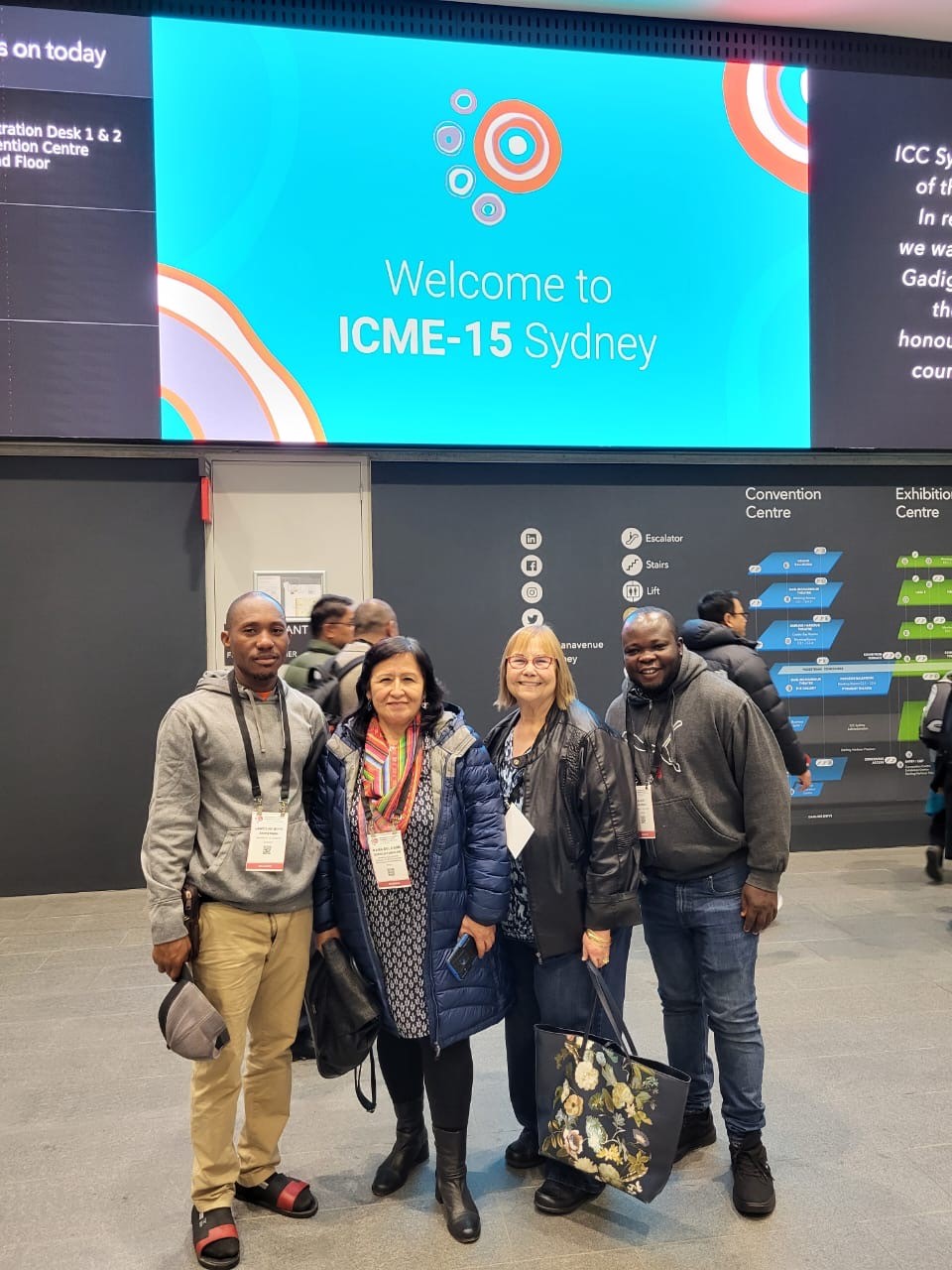
Indigenous peoples represent about 6.2% (476.6 million) of the world's population, living across the globe. The UN has a working definition of IPs, centered on three primary elements: 1) a pre-colonial presence in a particular territory, 2) a continuous cultural, linguistic, and social distinctiveness from the surrounding population, and 3) a self-identification as 'Indigenous' and recognition by other Indigenous groups as 'Indigenous'. The survey team first conducted a systematic literature review to explore mathematics education and indigenous perspectives. Our search strategy revolved around two main themes: mathematics education and Indigenous perspectives; and then secondly around the concept of Indigeneity. The literature review was limited to articles published in English and Spanish. We briefly summarize findings of the systematic literature review, organized according to geographic regions.
From Oceania (including indigenous peoples such as, e.g., Māori of New Zealand, Aboriginal and Torres Strait Islanders of Australia, Kanaka Maoli of Hawaii, and many others), we found 75 articles published between 1987 and 2023. The four most common themes were: incorporating cultural and Indigenous perspectives, knowledges, and practices in mathematics education; culturally responsive pedagogies and place-based mathematics education; the role of traditional counting systems and Indigenous mathematics in developing numerical cognition and mathematical understanding; and language and discourse in mathematics education for Indigenous and multilingual learners.
From Asia, (including indigenous peoples such as Tibetans and Uighurs of Western China, Ainu of Japan, Adivasi of India, Hmong of Thailand and others), we found 31 articles published between 1993 and 2022. The four most common themes were: historical perspectives on mathematics education; Indigenous mathematics and ethnomathematics; decolonizing mathematics education and incorporating Indigenous knowledges; and mathematics learning and cultural identities in Asian contexts.
From Europe (including indigenous peoples such as Sámi of Scandinavia, Basques of Spain and France), we found 25 articles published between 2000 and 2023. The three most common themes were: Sámi values and culture in mathematics education; Sámi braiding (ruvden) and its use in teaching discrete mathematics; and language diversity and cultural context in mathematics education.
From Africa (including, among others, San of southern Africa, Pygmies of Central Africa, Amazigh of North Africa), we found 33 articles published between 2003 and 2022. The four most common themes were: incorporating Indigenous games and cultural artifacts into mathematics teaching; exploring mathematical concepts embedded in Indigenous cultural practices; integrating Indigenous knowledge systems and ethnomathematics into mathematics curriculum; and decolonizing mathematics education and embracing Indigenous epistemologies.
From Latin America and the Caribbean (including, among others, Maya of Central America, Aymara of Andeans, Guarani of Paraguay, Taíno of Puerto Rico), we found 52 articles published between 2014 and 2024 in English and Spanish. The four most common dimensions were political, teacher training, mathematical, and sociocultural.
From Northern America (including, e.g., Navajo of Southwest, Cherokee of Southeast, Cree of Central Canada, or Inuit of Arctic regions), we found 97 articles published between 2000 and 2023. The four most common themes were: culturally responsive and place-based mathematics education; integrating Indigenous knowledges, cultures, and perspectives in mathematics education; decolonizing mathematics education and addressing the colonial legacy; and addressing inequities and promoting access and success in mathematics for Indigenous students.
This graphical representation of the number of articles published in English over the past 40 years suggests an increasing interest in the intersection of indigenous peoples’ experiences, cultures, and knowledge systems within the field of mathematics education.
Based on the preliminary analysis completed which introduced concepts of different dimensions related to Indigenous mathematics, the survey team, led by Maria, will work together to prepare an electronic survey of researchers in the fields of Indigenous mathematics, ethnomathematics, and other intersecting areas. The survey will be available in multiple languages as we recognize the limitations of the literature review.
4.3 ICME Survey 3 - Statistics and Data Science Education as a Vehicle for Empowering Citizens
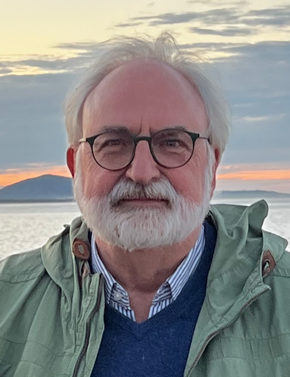
Survey Team
Rolf Biehler, Paderborn University (Germany), (team leader)
Takashi Kawakami, Utsunomiya University (Japan),
Erna Lampen, Stellenbosch University (South Africa),
Travis Weiland, University of North Carolina, Charlotte (United States),
Lucia Zapata-Cardona, Universidad De Antioquia (Colombia),
IPC Liaison: Katie Makar
School statistics has not kept pace with how citizens engage with increasingly ubiquitous data, such as navigating X-feeds, using artificial intelligence (AI) to identify photos, or how personal data is collected by social media and recommender platforms. Data science and data-driven AI have led to breakthroughs in science and society, however, such breakthroughs come with ethical concerns, creating a need to redefine how to empower citizens through statistics and data science education. The survey identified different pedagogical approaches for civic education, including (critical) statistical or data literacy, civic statistical literacy and data-driven mathematical, computational and algorithmic modelling, as well as more general data literacy, and critical data literacy. Recent books, articles, and special issues in statistical education and general education journals were reviewed.
When reviewing civic statistics and humanistic perspectives on data literacies education in the U.S. and Europe, we found that transdisciplinary themes have been prevalent for several years. Small-scale qualitative projects infused data literacy across the curriculum in (1) reading the world with data, making sense of others' data-based communication, including data viz and data journalism; (2) writing the world with data, using data practices to investigate the world around us, with students authentically engaging in the activities of the discipline through data investigations or creating data stories; (3) data structures and handling; and (4) technology, including developing, interacting with, and learning from technology.
When reviewing critical perspectives on data literacy emerging from Latin America, we found that critical data literacy, a skill set that enables people to use and produce data critically, with technical skills and reasoning at the intersection of data and context, is being promoted. In this region with high levels of social, cultural, and economic inequality, critical data literacy has been identified in research on school education as essential to making sense of the data that affects people's lives, to make informed decisions, to participate in public life, to expose systematic social injustices and to develop awareness of social issues.
When reviewing joint discourses between mathematical modeling and statistics/data science communities, we found that research at the interface of mathematical modeling and data science is increasing with three different discourses: (1) data-rich mathematical modeling processes are promoted with statistics and mathematics at their core to develop statistical and/or mathematical literacy and/or disciplinary learning, (2) interdisciplinary data-rich mathematical modeling to promote STEM literacy, (3) societal data-rich mathematical modeling using global, social, political, ethical, and everyday contexts to promote critical thinking and citizenship. All three discourses emphasize the cyclical nature of modeling and explore the relationship between discipline-specific approaches to modeling and the role of data in this.
When surveying what can mathematics/statistics education contribute to Artificial Intelligence/Machine Learning Literacy, we found that the discussion of AI literacy for secondary school students has expanded rapidly over the past few years. Machine learning involves predicting outcomes through mathematical and statistical modeling and a broader form of inference than sample-to-population inference. At least one type of machine learning should be taught in schools using a white or grey box approach, with decision trees and k-nearest neighbors as promising candidates. Understanding types of misclassification and differentiating between training and test data to address overfitting, bias, and fairness are important components. Research projects have been identified that make these concepts accessible to secondary school students through tools such as data cards, CODAP, and Jupyter notebooks.
We conclude that this review clearly indicates that statistics has evolved into data science with new tools, discourses, and various application domains. The data demands that pervade most societies require renewed attention to statistics education at school, data science education across disciplines, and research-informed decisions about curriculum and pedagogy.
The publication of a longer version of this report is under preparation. For a pre-order, please send an e-mail to .
4.4 ICME Survey 4 - Systematics Survey “Interdisciplinary Exchange among Mathematics Education and Neuroscience”
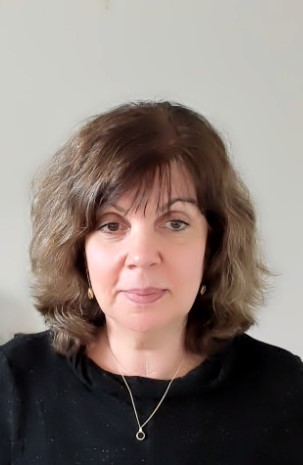
Survey Team
University of Haifa, Israel (team leader)
Hui-Yu Hsu, National Tsing Hua University, Taiwan
Daniel Ansari, Western University, Canada
Dor Abrahamson, University of California, United States
Andreas Obersteiner, Technische Universität München, Germany
Maayana Miskin, University of Haifa, Israel
Ilana Waisman, University of Haifa, Israel
IPC Liaison: David Gomez
Our team performed a systematic survey of empirical studies that employ neurocognitive methods in research focusing on mathematical learning, development and problem solving. The survey was aimed at tracing major trends of cognitive neuroscience research linked to mathematics education. In particular, we asked (a) How can the distribution and development of studies that integrate Mathematics Education and Neuroscience over time be characterized? (b) Which neuroscientific tools are used in studies linked to Mathematics Education? (c) Which mathematical topics/concepts are examined using the different tools?
How are the topics distributed among these tools? Which are the general trends observed through the survey and which recommendations can be made for the future development of research that integrates Mathematics Education and Neuroscience? Following the procedures of systematic surveys the research was performed in 3 stages: identification, screening, and analysis. Identification of relevant publications was conducted using the EBSCO discovery system. The screening stage followed restrictions of the empirical studies published in English-language research journals. Of a total of 35,692 records that were identified initially, 598 papers were found eligible for precise data analysis through screening procedures. We performed bibliometric and content analysis through employing descriptive and visualization network approaches. Our findings show a clear increase over the past 20 years in research combining neuroscience and mathematics education. The fMRI, EEG and Eye-tracking are the neuroscience tools most often used in this research. Neuroscience research on mathematical cognition has revealed insights into how our brains process, learn, and solve mathematical problems. These studies help explain individual differences in mathematical abilities and problem-solving skills. While researchers have used neuroscientific methods to examine a variety of mathematical topics and skills, the studies focusing on arithmetic objects and operations are the most frequent. At the same time, some branches including probability theory and advanced mathematics remain understudied.
Research methods in mathematical cognition have evolved over time, from established techniques like fMRI and brain mapping to eye-tracking focusing on mathematical reasoning. The field has progressed from studying numerosity and dyscalculia to exploring complex processes like algebraic thinking and problem-solving. Importantly, neurocognitive tools reveal that similar behavioral outcomes can stem from different neural processes – insights that traditional behavioral research alone cannot provide. This demonstrates the unique value of neuroscience in understanding mathematical thinking and its relationship to broader cognitive abilities.
Still current research in mathematics neurocognition has significant gaps: it focuses mainly on basic mathematical skills while neglecting advanced topics like calculus, and rarely examines domain-general cognitive traits. Additionally, most findings are published in neuroscience rather than education journals and thus mathematics educators may miss important developments. Future research should: (1) develop better tools to study diverse mathematical content and competencies, (2) establish rigorous methodologies specific to mathematics education as neurocognitive tools become more accessible, and (3) investigate how classroom dynamics and cognitive mechanisms influence mathematical learning. This interdisciplinary approach could help educators better understand and address individual differences in mathematical processing.
5. Reflections on ICMEs from someone who attended all but the first one.
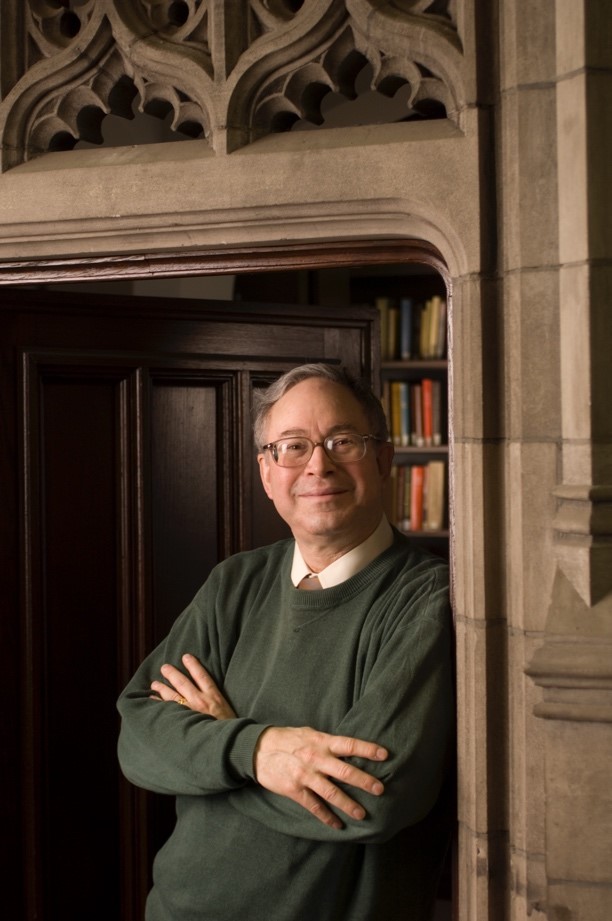
Zalman Usiskin – Professor Emeritus – The University of Chicago, USA.
I have attended every ICME since ICME-2 in Exeter, if one counts attending ICME-14 in Shanghai remotely by Zoom as "attending". I looked forward to coming to Australia for ICME-15 with special anticipation, because of the 8-year in-person gap since ICME-13 in Hamburg, and also because this would be the first ICME that I attended in person in which I was not somewhere on the program either as a workshop or discussion leader, or as an invited lecturer.
It is notable how much the ICMEs have changed over the years. In those early ICMEs the plenary addresses could be given in any of several languages, and we who attended expected to wear headphones to hear simultaneous translations of the major presentations. Also, at the early ICMEs there were not many attendees from outside of Europe and North America. The decisions to have ICME-5 in Australia in 1984, and then ICME-9 in Japan in 2000 were instrumental in broadening the ICME reach. Although ICME-14 in China suffered from almost no in-person attendance from abroad, I think the presence of ICME-14 in China and the relative closeness of Australia combined to result in large numbers of Chinese attending ICME-15.
Along with the broadening of the geography of the venues over the years has been the introduction of the Solidarity Funds allocating a part of each person's registration fee to give grants to people from countries who otherwise could not afford to attend. This program enabled the organizers of ICME-15 to support attendees from Africa, East Asia, and South Asia in numbers the ICMEs had not seen before, and confirmed that mathematics is an international language, and that though the world is diverse, we can all learn from each other. Having English as the language of all presentations, though difficult for some speakers, brought home that we are all of one family. The morning and afternoon breaks between sessions, with a large room (and refreshments) gave more opportunities to socialize than I recall in previous ICMEs, contributing to a family atmosphere.
Of course, the ICMEs are an academic conference; the social part is important but not the rationale for an international meeting. In theory, an attendee is expected to attend all the plenary sessions; I attended most but not all. We select Workshops and Topic Study Groups (TSGs) and are expected to stick with them through the week, and add various other sessions to those. I'm not certain what percent of attendees did that. There is a tension between wanting to attend all the meetings of a particular group, and wanting to diversify one's experiences. Having had obligations at many previous ICMEs to remain in one group, and with an interest in many aspects of mathematics curriculum and policy, I valued my freedom to move around. I attended TSGs dealing with geometry, statistics, and gifted students - all groups where I knew some other attendees - and did not feel I missed much by not attending all three of the meetings of any of these groups.
We speak of mathematics as an international language, the ICMEs display an international community of mathematics educators, and we have universal goals such as improving access, widening the umbrella of competence, modernizing the educational experience, and taking advantage of developments outside our everyday experience. But it would be both naive and wrong to believe that what works well in one place, or even in all places within a country, can automatically be extended or even adapted to work well elsewhere. And it would also be naive to think even that those who come from the same place or the same part of the world have common thoughts about the condition of school mathematics in their homeland, or how mathematics should be taught and learned. We come to share and contrast our experiences and our problems and solutions, and to learn from each other, and in these regards ICME-15 was a wonderfully successful conference situated in a beautiful convention center in a great city.
6. News from the Commission for Developing Countries (CDC)
Ludovic Rifford, CDC Secretary for Policy
The next International Congress of Mathematicians will take place in Philadelphia, USA, from July 23 to July 30, 2026. The call for applications for the ICM 2026 Travel Support Program, which provides financial support to mathematicians from eligible developing countries to attend, is now closed. The program received an impressive number of applications from across all continents. Applicants will be notified of the results in the spring of 2025.
We would like also to remind you about the IMU-Simons Research Fellowship Program for Developing Countries, generously funded by the Simons Foundation. This grant program, introduced in early 2024, supports mathematicians based in developing countries in undertaking collaborative research at mathematical institutions abroad. The CDC strongly encourages mathematicians and students from developing countries to apply to our calls listed below and to contact us for further detail via email at .
Grants for Institutions
- Volunteer Lecturer Program (next deadline January 15, 2025, for courses to be held between June 1, 2025, and June 1, 2026)
- Library Assistance Scheme (no fixed deadline)
Grants for Conferences and Projects
- Conference Support Program (next deadline January 15, 2025, for conferences starting after May 15, 2025)
Grants to Individuals
- Abel Visiting Scholar Program (next deadline December 31, 2024, for research visits between May 1 and August 31, 2025)
- IMU-Simons Research Fellowship Program for Developing Countries (next deadline January 15, 2025, for research visits starting between June 1, 2025, and June 1, 2026)
Graduate Scholarships
- IMU Breakout Graduate Fellowship Program (the 2025 call for nomination will open no later than March 1, 2025)
- Graduate Research Assistantships in Developing Countries (GRAID) Program (the 2025 call for applications will open in early January 2025 with deadline on March 15, 2025)
7. Reference to two articles recently published in the European Mathematical Society Magazine
7.1 A resource supporting the development of mathematics: The IMU/ICMI Archive
ICMI column presented by Birgit Seeliger and Bernard R. Hodgson
7.2 Memorabilia from past ICMs recently acquired by the IMU Archive
By June E. Barrow-Green, London School of Economics and Political Science, UK; Open University, Milton Keynes, UK.
This article follows on from the article on the IMU/ICMI Archive by Birgit Seeliger and Bernard R. Hodgson.
8. News from ICMI Country representatives and Affiliate organizations
8.1 News from Argentina - 47th Argentinian Mathematics Education Meeting (REM, for its Spanish acronym). A brief and personal report.
Cristina B. Esteley, ICMI CR for Argentina
The 47th REM was held on September 17-20, 2024 in the city of Catamarca (northwestern Argentina). As part of REM's identity, linked to its origins, the 47th REM was held in conjunction with the annual scientific meeting of mathematics organised by the Argentine Mathematical Union (AMU).
Briefly, REM and the joint AMU meetings started in 1977, at a time when the development of mathematics education (ME) as a scientific field was almost null in Argentina. In that year, motivated by the international advances in ME, a group of mathematicians proposed holding the first REM within the framework of the existing AMU meetings. Currently, the REM continues to be held annually and coexists with other Argentine encounters on ME.
The 47th REM activities were organized by the AMU Education Commission (created in 2015). The activities for the 47th REM were organized by the commission into three main categories of work: three plenary lectures, workshops for teachers or future teachers and oral presentations on research reports (RR) or accounts of classroom experiences (CE).
The first lecture highlighted collaboration as a distinctive feature of teacher education. The second presented the case of a collaborative work developed under the Lesson Studies model in Brazil. The third dealt with cognitive and epistemological issues related to real numbers. The presentations in the three lectures are based on the research of the lecturers. Regarding the workshops, two of them focused their activities on educational work with mathematical processes (e.g., modelling, validation, problem solving) facilitated by digital technologies (DT). A third was interested in the understanding of real numbers in Argentinean secondary schools. A fourth developed ideas about problem solving as a challenge for classroom work. The fifth reflected on the demand for incorporating learning and knowledge technologies in some schools and the role that mathematics classes can have in that context. Given the diversity of topics and possible interests of the teachers in attendance, the RRs and CEs were grouped according to the educational level on which they focused. Without intending to be exhaustive, I point out that, among RR, we could distinguish studies interested in teacher education mediated by different educational formats or resources (e.g., DT, use of videos, STEAM education) and studies interested in the teaching, learning or senses about mathematical contents generated in certain educational environments. As for CE, most of them present innovative proposals, for example, incorporating DT in classes or the application of mathematical models in different problems. Most of them focus on the teaching of university mathematics to non-mathematicians.
The following images illustrate moments of the meetings. Image 1 corresponds to one of the REM workshops and image 2 shows a group of participants of both meetings.

The next 48 REM and 74-AMU meeting will be held in December 2025 in the city of Bariloche (southwestern Argentina) in conjunction with the Spanish Royal Mathematical Society.
8.2 News from France – An international symposium in tribute to Guy Brousseau will be held from July 7 to 10, 2025 at the University of Bordeaux (France).
The symposium is open to researchers, teachers and trainers (free registration for primary and secondary school teachers).
A website dedicated to the symposium is now available.
You will find a presentation of the symposium and its scientific orientations, as well as a call for papers. The deadline for submissions is February 14, 2025. The language of the symposium is French; however, proposals for oral or poster presentations may be submitted in English or Spanish. Accepted oral papers presented in English or Spanish must be accompanied by a paper in French. Workshop proposals, as well as their organization if accepted, must be in French.
This symposium is first and foremost an opportunity to share the decisive role played by Guy Brousseau and the theory of didactic situations in numerous institutions, associations and actions for schools and mathematics teaching at local level (COREM, IREM de Bordeaux, LADIST, DAEST, Lab-E3D), at the level of the national research community (ARDM, ADIREM, CFEM, SFdS) and internationally (ERME, ICMI), on the side of teachers and teacher trainers (COPIRELEM, CORFEM).
The symposium will also highlight the living nature of the theory of didactic situations. It will provide a forum for reflection on the way in which its foundations, concepts and methodological tools are still being used today in many didactic mathematics studies, and more generally in research on education, in France and around the world.
We hope to see many of you in Bordeaux for this scientific event.
For the scientific and program committees, Anne-Cécile Mathé and Viviane Durand-Guerrier. For the local organizing committee, Lalina Coulange and Marie-Line Chabanol.
8.3 News From Morocco – International Symposium on Mathematics Education
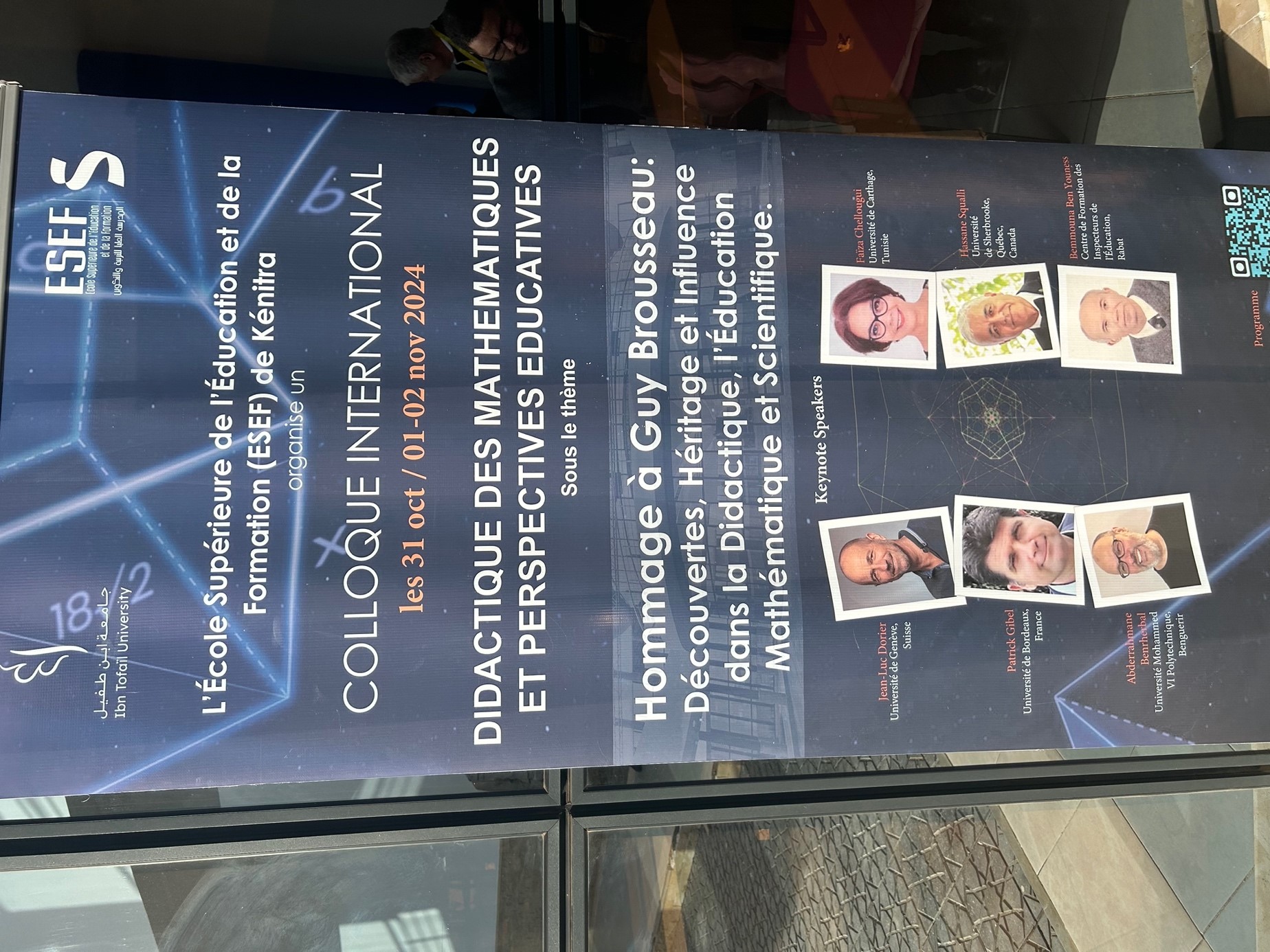
"Tribute to Guy Brousseau: Discoveries, Legacy, and Influence in Mathematical Education" was the central theme of an International Symposium on Mathematics Education, held from October 31 to November 2, 2024, at the Higher School of Education and Training, University Ibn Tofail, in Kénitra—a picturesque coastal city located north of Rabat, Morocco's capital.
This scholarly gathering attracted researchers from an array of international contexts, including Canada, France, Morocco, Niger, Switzerland, and Tunisia. The colloquium featured a comprehensive academic program comprising six plenary sessions, numerous parallel presentations, and four specialized workshops. A significant portion of the presentations were strategically designed to illuminate Guy Brousseau's profound and far-reaching contributions to mathematics education, extending well beyond the traditional boundaries of French academic discourse.
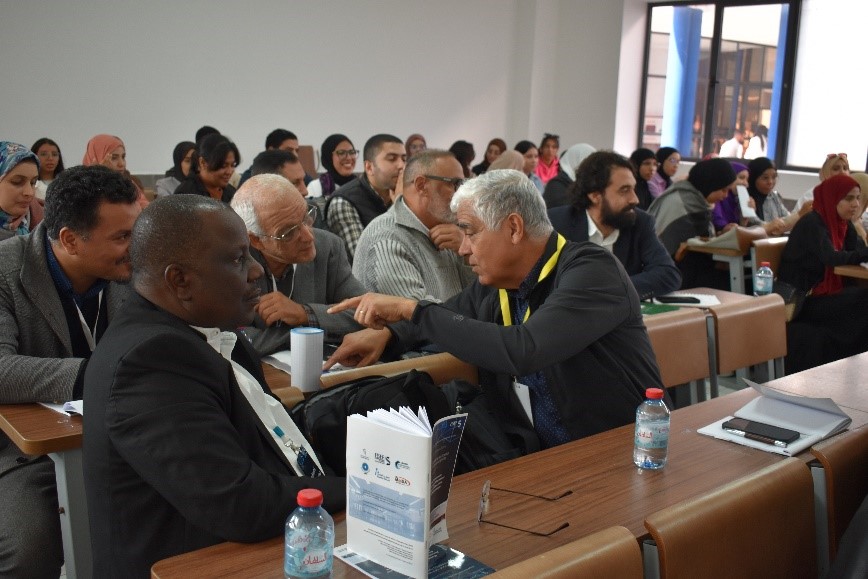
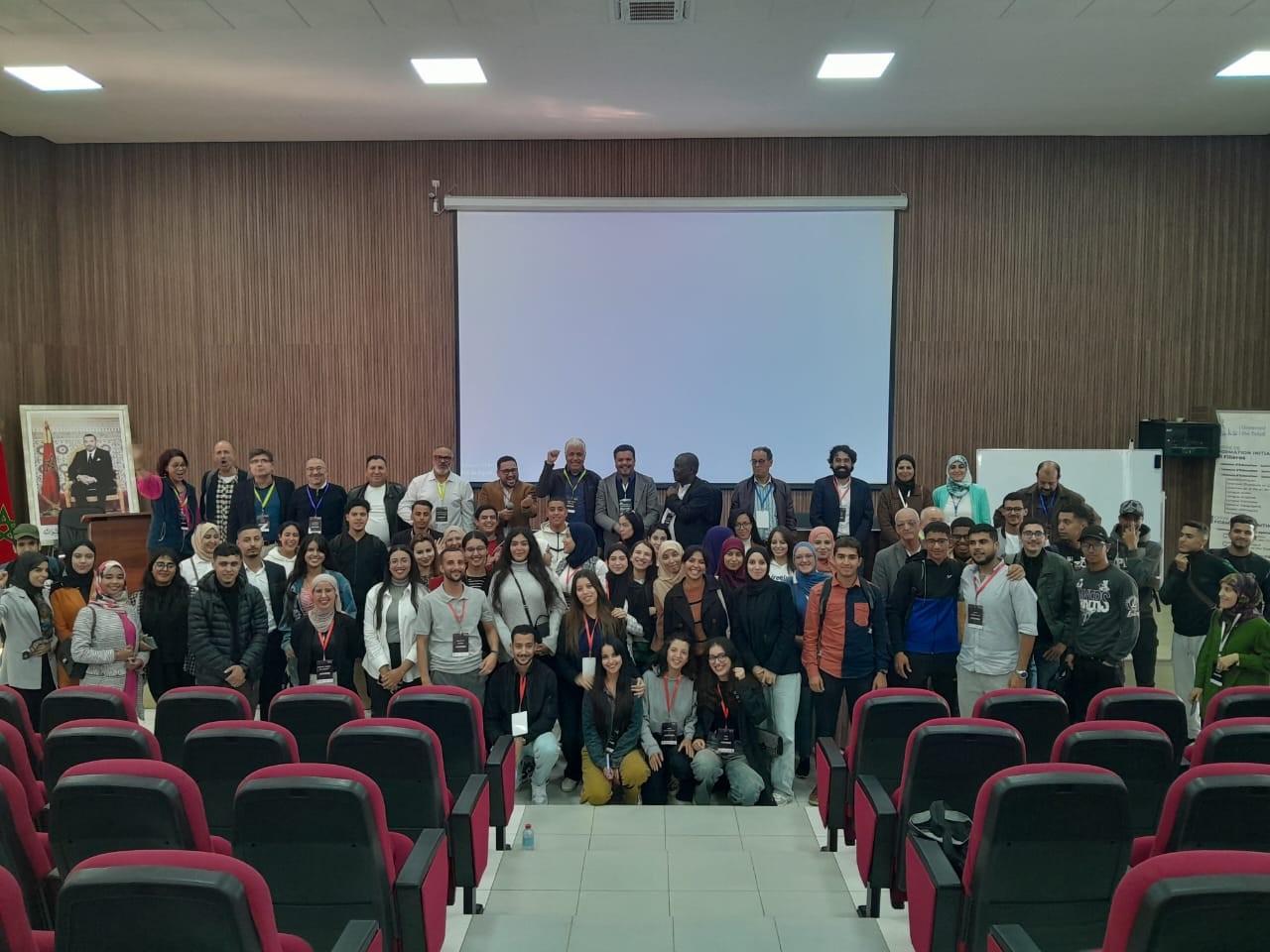
8.4 News from the Netherlands
Michiel Doorman, ICMI CR.
In the Netherlands we celebrate this year the 100th anniversary of the Dutch Association of Mathematics Teachers (NVvW). The festivities started at the yearly study conference on Saturday November 2, with some 300 participating teachers. The program included a historical lecture by Desiree Agterberg and a future-oriented contribution by Monique Pijls on the relevance of the maker movement for mathematics education (see Figure 1). During the whole year regional events are organized to involve as many teachers as possible in this special event.
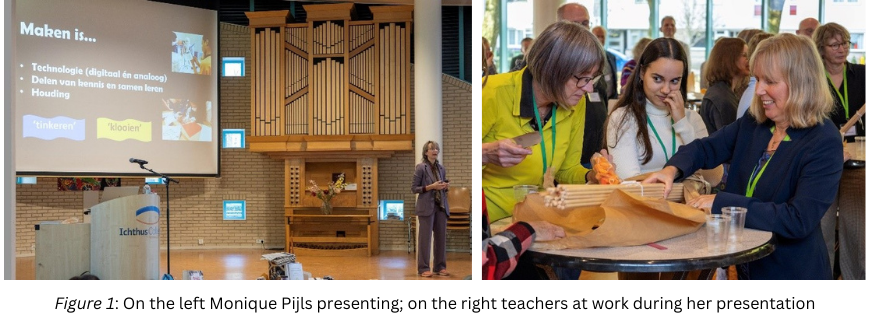
This academic year will also be important for try-outs of attainment targets for mathematics for three levels: primary education, lower secondary education and special education. The targets provide more clear, but still brief, specifications of what students are expected to master at these levels. A new element in the documents is attention to the relation between mathematics and the world: students need to learn to deal with mathematical information and phenomena that they can meet in their lives, and they need to learn about the multicultural roots of mathematics. This domain in particular addresses the development of a mathematical attitude. See: https://www.slo.nl/thema/meer/actualisatie-kerndoelen-examenprogramma/actualisatie-kerndoelen/definitieve-conceptkerndoelen-rekenen/ (in Dutch)
In addition, the exam programs are in development. Concept versions of new programs for the end of secondary school have been published and this year will also be devoted to field tests. See: https://www.slo.nl/thema/meer/actualisatie-kerndoelen-examenprogramma/actualisatie-examenprogramma/examenprogramma-wiskunde-havo-vwo/ (in Dutch)
New in these programs is more explicit attention to modelling and problem solving in the attainment targets, more attention to statistics, and less diversity in topics, in particular for students following a Culture & Society stream.
Furthermore, the minister of education initiated a master plan basic skills in mathematics and established a Centre of Expertise (ExpRW) at the Freudenthal Institute. In this Centre the institute collaborates with the Dutch mathematics teacher association (NVvW) and the association for primary mathematics education (NVORWO) and other partners (see Figure 2).
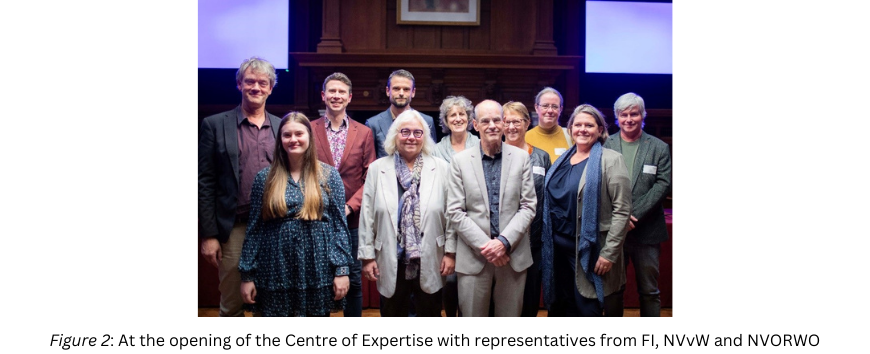
The Centre of Expertise is expected to focus on the quality of mathematics education in the Netherlands. The Centre supports the education field in implementing new developments in mathematics education around basic skills, core objectives and curriculum innovations.
8.5 News From South Africa – Association for Mathematics Education of South Africa (AMESA)
Compiled by South Africa Country Representative: Dr VG Govender to ICMI
The Association for Mathematics Education of South Africa was formed in June 1993, just less than a year before the first democratic elections of South Africa in April 1994. Since 1994, AMESA has had 29 National Congresses, the last one being in Kimberley, Northern Cape in June 2024.
South African Mathematics Team Competition
The South African Mathematics Team Competition took place on Saturday September 14, 2024. Teams from different schools combine to form local or regional teams, comprising junior learners (from Grade 8 & 9) and senior learners (from Grades 10 – 12). The first part of the Competition is a one-hour individual problem paper, consisting of 15 problems in multiple-choice format. After a break for refreshments and a discussion of team strategy, the second part of the Competition takes place. The second part consists of ten difficult problems, but now the teams may work together and must submit just one set of answers. The current champions for both the Junior and Senior sections hail from the Western Cape Province of South Africa.
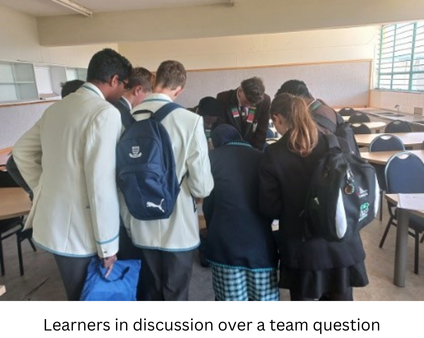
South African Mathematics Awards
The South African Mathematics Foundation, comprising the Association for Mathematics Education in South Africa (AMESA) and the South African Mathematics Society, held its annual awards on Saturday October 19, 2024 in Cape Town. 102 learners from Grades 4 to 12, accompanied by their parents/teachers as well as undergraduate and post-graduate students, attended the event where they received certificates and medals for outstanding achievement in the South African Mathematics Challenge, the Old Mutual South African Mathematics Olympiad, the ASSA Mathematics Team Competition and the Standard Bank South African Mathematics Tertiary Olympiad.

AMESA Review of Grade 12 Mathematics related Examinations
The final school year exit level Grade 12 mathematics related examinations (Mathematics/Mathematical Literacy/Technical Mathematics) took place on November 1 and 4, 2024. Learners in South Africa choose Mathematics/Technical Mathematics or Mathematical Literacy from Grade 10 onwards. AMESA has just completed a review of these Grade 12 papers: The key issues discussed in the review include the following:
Technical aspects; Language used; Syllabus coverage; Standard of the paper; Compliance with levels of thinking (cognitive levels); Comparison to the previous year’s paper; Learners’ views on the papers, Unfair questions and Overall verdict.
The review, which provides constructive feedback on the Grade 12 papers, is sent to the Department of Basic Education (DBE) in South Africa. AMESA does this in the spirit of promoting mathematics education and enhancing the quality of the teaching and learning of Mathematics related subjects in South Africa. The report and the question- by- question analyses are likely to be useful to the examiners, moderators, and markers. This is done in its attempt to promote a high standard of mathematics education in South Africa. The DBE, school teachers, Subject Advisors, university academics and others are also likely to find the reports thought-provoking and useful.
Teachers involved in the Grade 12 review for 2024 (at one site)

8.6 News for the International Group for the Psychology of Mathematics Education (IGPME)

PME 48: The Annual Conference of the International Group for the Psychology of Mathematics Education will be held from July 28 to August 2, 2025 In Santiago, Chile.
The theme of the conference is: “Making sure that mathematics education research reaches the classroom.”
More information on the website: https://eventos.cmm.uchile.cl/pme48/
8.7 News from the African Mathematical Education Association (AFRICMA)
The first announcement of the next conference AFRICME7 is available online.
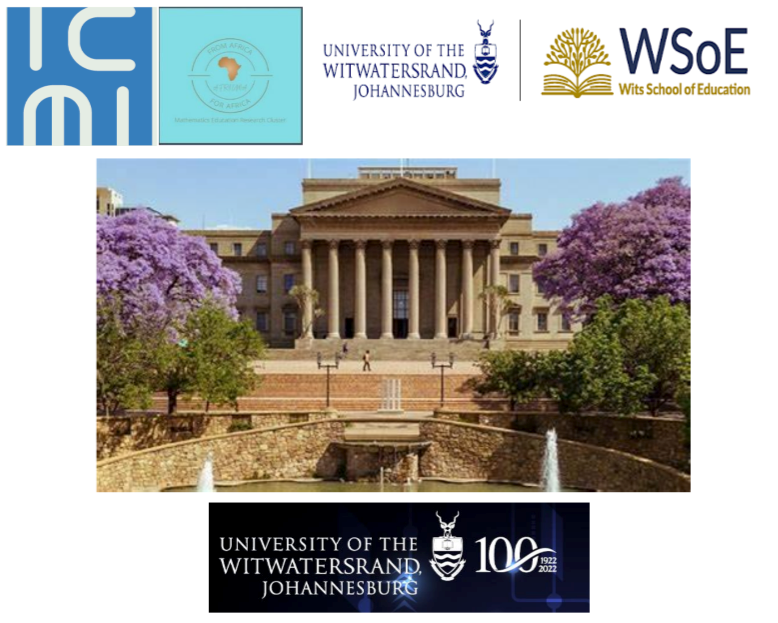
AFRICME7 will be held at the School of Education, University of the Witwatersrand, Johannesburg, South Africa from July 15-18, 2025.
Conference Theme: Acknowledging and Addressing Barriers of Mathematics Education for an Inclusive Africa
Subthemes:
- inclusivity and diversity within the mathematics classrooms during the AI era.
- leveraging technology to enhance mathematics learning experiences in the AI age
- the mathematics of data science in the AI age
- cultural and socially aligned mathematics pedagogy (ethnomathematics, Indigenous knowledge) in the AI age
- pedagogical issues in mathematics education and mathematics teacher professional development at primary and high school
- trans- and inter-disciplinary STEM education
- language and communications in mathematics education
- mathematical modelling and computational thinking
- use of textbooks as resources for teaching and learning mathematics
Call for Proposals (Long Papers, Short Papers, Working Groups, Oral Communications, Posters, and Symposiums)
This is the first announcement calling for proposals from mathematics education and STEM education researchers to be submitted for the AFRICME7 conference that will be held in Johannesburg, South Africa, in 2025. Interested teachers are invited to submit “How I Teach” papers to present in the Mathematics Teacher Professional Development sessions. These submissions are not compulsory for participating teachers but are desirable for the conference.
Details on format, template, and submission will be made available later in November 2024.
8.8 News from the International Commission for the Study and Improvement of Mathematics Teaching (CIEAEM)
by Cristina Sabena, President of CIEAEM
CIEAEM76 will be held in Philadelphia, USA, July 21-25, 2025
It's with pleasure that we announce that the CIEAEM76 (International Commission for the Study and Improvement of Mathematics Teaching) conference will be held in Philadelphia (USA) from July 21 to 25, 2025. The conference will focus on the theme "New Realities, Current Practices and Future Orientations for Mathematics Education. How can curriculum anticipate and prepare for a changing world?" as proposed by the IPC chaired by Peter Appelbaum and composed of Ana Serrado Bayes, Andreas Moutsios-Rentzos, Audrey Cooke, Charoula Stathopoulou, Gail FitzSimons, Gilles Aldon, Giulia Giovanna Bini, Javier Díez-Palomar, Lisa Björklund Boistrup, Marcelo Almeida Bairral, Michaela Kaslová, and Susan Gerofsky.
The conference will focus on the evolving role of mathematics education in addressing the challenges of a rapidly changing world, characterized by technological advances, environmental crises, and social inequities. Participants will explore how mathematics can equip learners to engage with societal issues, adapt to technological innovations, and address global crises. Reflecting on the historic 2000 "CIEAEM Manifesto", the conference seeks to update its vision to make mathematics education more relevant and proactive.
The conference will include working group discussions, poster sessions, and workshops aimed at sharing research, innovative practices, and cross-cultural collaboration. The event aspires to generate actionable recommendations and an updated CIEAEM manifesto to guide mathematics education in the coming decades.
The First Announcement of the CIEAEM76 conference may be found on the website and the Second Announcement, including registration fee and deadlines and information on how to contribute, will be made available in January 2025, or earlier.
For further information and any questions we invite you to write to .

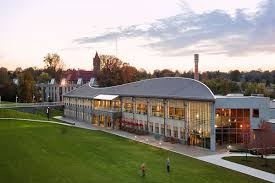
8.9 News from the Inter- American Committee on Mathematical Education (IACME) Executive Team
By Angel Ruiz, President International Council, Inter-American Committee of Mathematics Education
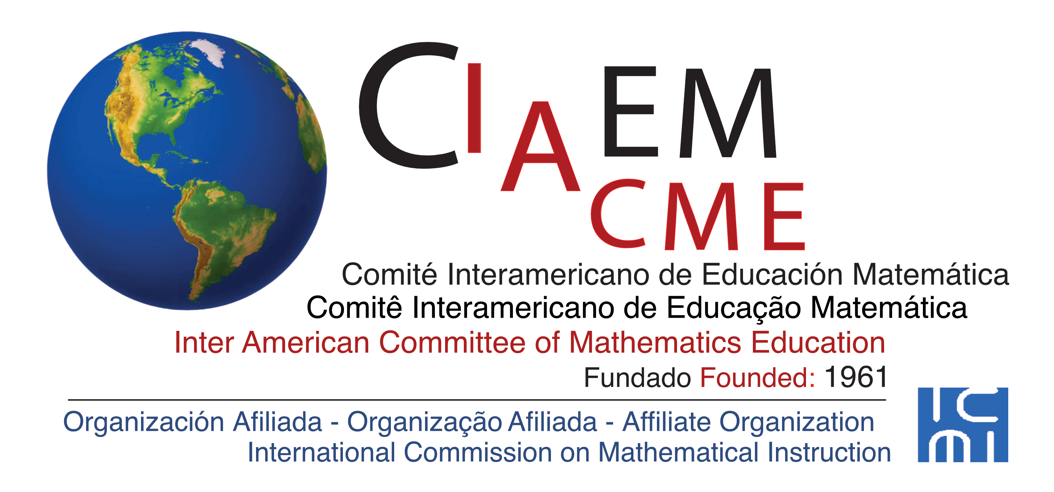
Eduardo Mancera (México), president of the Inter-American Committee of Mathematics Education Executive Team, passed away at the end of October (he and his team were elected during the IACME Conference held in Lima, Perú, 2023).
This ICMI affiliated multinational organization completed a process to establish a new Executive for 2024-2027 that finally approved the following team:
President: Patrick Scott (USA)
First Vice-Chairperson: Yuriko Yamamoto-Baldin (Brazil)
Second Vice-Chairperson: Nelly León (Venezuela)
Secretary of Organization: Soledad Estrella (Chile)
Secretary for Technological Affairs: Yuri Morales (Costa Rica)
Regional members-at-large:
- North America: Adrián Gómez Árciga (Mexico)
- Central America: Ricardo Poveda (Costa Rica)
- The Caribbean: Sarah González (Dominican Republic)
- Andean Region: Eulalia Calle (Ecuador)
- Southern Cone: Claudia Vargas (Chile)
- Luso-American Region: Alessandro Ribeiro (Brazil)
8.10 News from the International Organization for Women in Mathematics Education (IOWME)
IOWME Report - December 2024
The IOWME session was held on July 9, 2024 at the ICME-15 in Sydney, Australia. The session was well-attended, with approximately 30 people from more than 10 countries present. At the session, I shared the history of IOWME and provided an overview of recent projects, such as the Mathematics Education Research Journal special issue (Hall & Norén, 2021) and the updated gender/sexuality and mathematics publications list, which is hosted on the IOWME website and contains well over 500 publications, arranged by decade. Attendees were very impressed with the publications list, and a few attendees volunteered to compile lists of gender/sexuality publications in other languages.
During the session, participants had the opportunity to discuss gender/sexuality issues and research in small groups, as well as consider whether IOWME was still an appropriate name for the group, or whether the term women should be changed to gender to better reflect the focus of research in this area, with approximately 80% of participants voting (informally) for the latter option. I will thus pursue the possibility of a name change for the group.
Jennifer Hall, IOWME Co-Convenor on behalf of Vanessa Neto, IOWME Co-Convenor
Study Invitation - Retired Math Ed Professors/Academics
Dr. Jennifer Hall of Monash University (Australia) and Dr. Lynda Wiest of the University of Reno, Nevada (U.S.A.) are conducting a study entitled The Lived Experiences of Retired Mathematics Education Professors/Academics (Monash University Project Number: 45351). If you are a retired mathematics education professor/academic, you are invited to take part in the study.
ln this project, we seek to understand how mathematics education professors/academics plan for and experience retirement. The purpose of our study is to contribute new knowledge about the experiences of retired mathematics education professors/academics, an understudied group in educational research. The findings may be used to inform current mathematics education professors’/academics’ retirement planning.
The study has two parts: (a) an online questionnaire and (b) a Zoom interview. You are welcome to take part in one or both parts. If you wish to complete the questionnaire, please click on the link above. If you wish to complete an interview, please email Jennifer Hall at .
Thank you very much for your consideration!
8.11 News from the International Study Group on Ethnomathematics (ISGEm)
Milton Rosa - ISGEm President -
In 1985, the International Study Group on Ethnomathematics (ISGEm) launched Ethnomathematics internationally and helped this program to grow theoretically and methodologically. Also, in August 1985, the ISGEm Newsletter was launched and published twice a year: May and November. Investigators, researchers, professors, teachers, students and people interested in this research field are encouraged to contribute with concept papers, information on research in Ethnomathematics, particulars on relevant professional meetings, study groups, min-articles, and book reviews. Annotated bibliographic entries are particularly solicited, and any ideas for promoting the study of Ethnomathematics.

In relation to the current status of ISGEm, it is important to state here that its Executive Board was elected in January 2020, and since then, members of the Executive Board have been working hard to revitalize ISGEm. The Executive Board is having regular meetings via GoogleMeet to discuss actions that can be taken in the short-, medium-, and long-term goals. In this context, ISGEm is conducting the following activities named as: short-term goals, medium-term goals, and long-term goals.
ISGEm supports the development of activities and publications that improve collaboration, exchange, and dissemination of ideas and information on all aspects of theoretical, methodological, and practical bases of ethnomathematics and its connections to mathematics education, total peace, social justice, decolonization processes regarding to the procedures, techniques, strategies and practices developed locally, globally, and glocally by members of distinct cultural groups. It also helps to improve the quality of mathematics teaching and learning worldwide through ethnomathematics and the connections between mathematics and culture in order to respect and value diverse modes of doing mathematics, as well as to support and assist meetings and/or conferences of affiliate organizations.
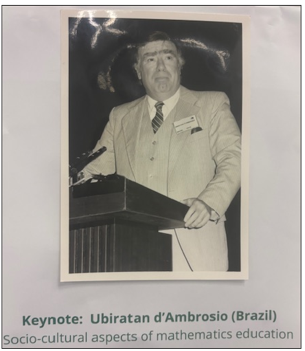
Some early ethnomathematics investigations came from people who worked in international and cross-cultural settings and tried to highlight mathematics that had been held back by neglect and oppression. Philosophical and anthropological studies in ethnomathematics also demonstrate cultural mathematical relationships that have been blocked or ignored. In recent years, there has been a new surge in concerns for oppressed and left-out people. As ISGEm and ethnomathematics in general move on past this almost forty-years anniversary, the challenges of these times of fakenews, pandemics, and wars, environmental and sociocultural issues fit into the underlying objectives of ethnomathematics.
8.12 News from the International Study Group on the Relations between the History and Pedagogy of Mathematics (HPM)
As usual, summer has been quite busy. There have been several events of interest for our group. In fact, many of them have been promoted, organized or coordinated by members of the HPM community.
First, shortly before ICME-15, and as a satellite event, the 11th meeting of the HPM group was held on the Campus of the University New South Wales. This was already reported in September’s ICMI newsletter.
Then, three activities were held during ICME-15. Topic Study Group 5.4 “The role of the history of mathematics in mathematics education” (Abdellah el Idrissi, and Renaud Chorlay), and two discussion groups: “Epistemology, history and sociology in mathematics teachers’ education: interactions and implementations” (Évelyne Barbin, David Guillemete, and Ysette Weiss), and “History of Mathematics Education: accomplishments and open questions” (Alexander Karp).
In addition to all these ICME-15 related events, two more conferences took place during summer. The first Summer School in the History of Mathematics Education was held in Lisbon (Universidade NOVA) in July. Also, the eighth offering of the International Conference on the History of Mathematics Education was held in Warsaw (Polish Academy of Sciences) in September (see picture of the opening ceremony).
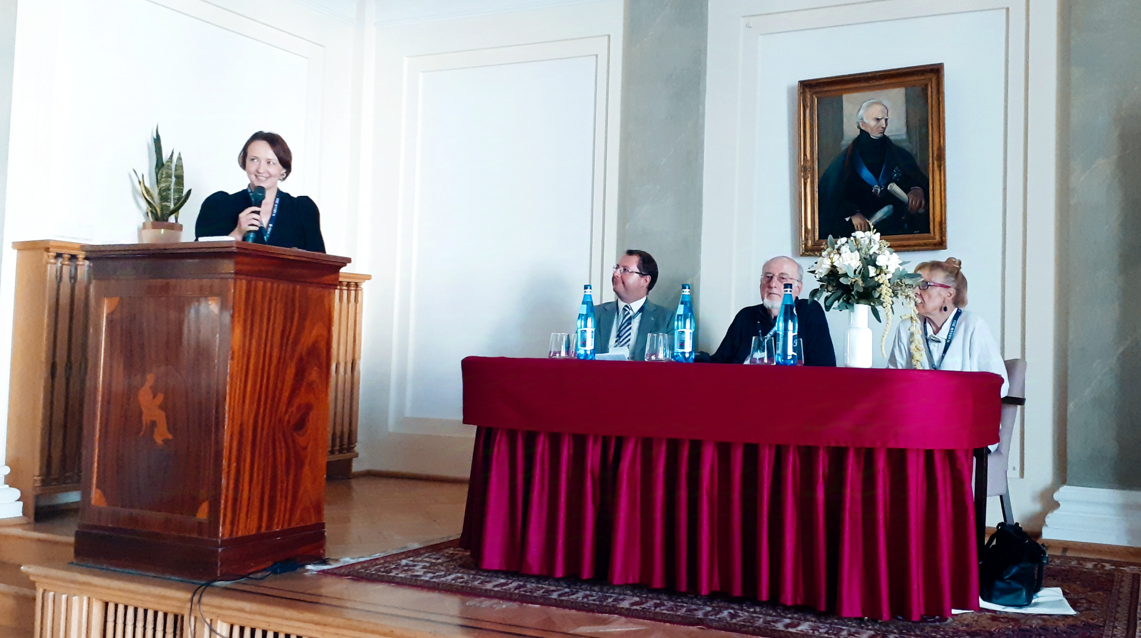
This surely proves that we are a lively and active community. For more information on the group’s activities, we invite all the interested members of ICMI to visit our website and to read our recently published newsletter.
9. Conferences to come
Congress of the European Society for Research in Mathematics Education (CERME14)
Dates: Feb. 4-8, 2025
Location: Bozen-Bolzano, Italy
More information on the website.
l'Espace Mathématique Francophone (EMF 2025)
Dates: May 26 - 30, 2025
Locartion: Montréal, Canada
More information on the website.
Annual Conference of the International Group for the Psychology of Mathematics Education (PME)
Dates: PME 48, July 28 to August, 2 2025
Location: Santiago, Chile
More information on the website.
World Federation of National Mathematics Competitions - WFNMC-10
Dates: 2026 (Date tbc)
Location: Kuala Lumpur, Malaysia
More information on the website.
International Conference on the Teaching of Mathematical Modelling and Application- ICTMA-22
Dates:August 10 - 15, 2025
Location: Sweden at Linköping University
More information on the website.
9th ICMI-East Asia Regional Conference on Mathematics Education (EARCOME 9)
Dates: July 18-22, 2025
Location: Seoul National University, Siheung Campus, Korea,
The theme of the conference is “RE: Visiting the Essence of Mathematics Education in the Era of Digital Transformation.
More information on the website.
International Group for Mathematical Creativity and Giftedness- (MCG) 14th conference
Dates: on June 16 - 18, 2025
Location: Karlstad, Sweden
More information on the website.
International Society for Design and Development in Education - ISDDE
Dates: May 19-22, 2025
Lcoation: University of Galway, Ireland
More information on the website.
Comité Interamericano de Educación Matemática/ CIAEM (Interamerican Committee on Mathematics Education IACME)
IV Congreso de Educación Matemática de América Central y El Caribe (IV CEMACYC)
Dates: November 2-7, 2025
Location: Santo Domingo, Domenican Republic
More information on the website.
